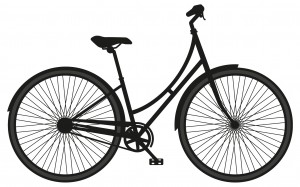By Lisa Oyolu
oyolulis17@grinnell.edu
On Wednesday, Sept. 25, members of the campus community received an email from Stephen Briscoe, Director of Campus Safety & Security, informing them that Security would begin confiscating bikes left in unauthorized areas, and the bike owners would be fined in accordance with the College’s bike policy.
This policy, included in the Student Handbook, requires that students assume responsibility for storing their bikes. It states that bikes can only be parked in bike racks. As per Briscoe’s email, bikes parked in other areas, especially those locked to hand-rails, pose a safety and accessibility problem.
While the policy has existed for some time, it has recently been more rigorously enforced than in the past. Security has been cutting the locks from bikes that are incorrectly parked and confiscating them.
Briscoe feels that this recent step up in enforcement serves a two-fold purpose: it not only addresses widespread concern about inappropriately placed bikes, but also serves to improve the visual appeal of the campus.
“They sent [third-party image auditors] in here to the College, looking at the College and trying to help us keep the whole campus beautiful,” Briscoe said. “Also, we’ve gotten complaints from faculty, staff, students and different people about bikes being attached
to handrails, lying in areas that are blocking handicapped people, lying in areas that are blocking people from walking and so we went out there and started enforcing it.”
Some students, however, see Grinnell’s bike culture as one of the College’s major selling points and find the recent bike confiscations problematic.
“One of the great things [about Grinnell] is that you can walk around and see bikes everywhere and see that the students are very environmentally-conscious; they don’t drive everywhere. They walk, or they have this really great transportation [of bikes],” said Ben Mothershead ’16, who had his bike confiscated by Security last week.
Mothershead believes that the main reason many bikes around campus are not locked in bike racks is that the number of bikes far outstrips the number of available racks.
“Around the JRC, Noyce and the ARH, there really aren’t any bike racks. They put a few new ones in, but if you look outside, they’re always filled to capacity. So for students looking to put their bikes somewhere without getting it damaged from bumping up against a bunch of other bikes, there aren’t really any other places to put it except for against a tree,” he said.
Mothershead also feels that there is a lack of clarity in the bike policy. He complained that the confiscation process often leads to damage to the bikes and that cutting bike locks—many of which are expensive—has led to increased bike theft.
“Some students have also had their bikes stolen after retrieving them from security, since they no longer had locks on them,” Mothershead said.
Despite the allegations of bikes being damaged during the confiscation process, Briscoe contends that many of the bikes were in a poor condition prior to being handled by Security.
“A lot of the bikes, I look at them, and some of them are damaged already. So if a student came to me and said ‘My bike got damaged during this process,’ we would do the right thing and work with them to get their bike fixed,” Briscoe said.
Regarding the issue of bike theft, Briscoe encourages students to register their bikes.
“We offer a free program of registration, and we give [students] a free sticker for registration, and they can put that registration on their bikes, so if their bikes get stolen, and it is registered, then it helps [Campus Security] and the police to recover that stolen bike,” he said.





























































